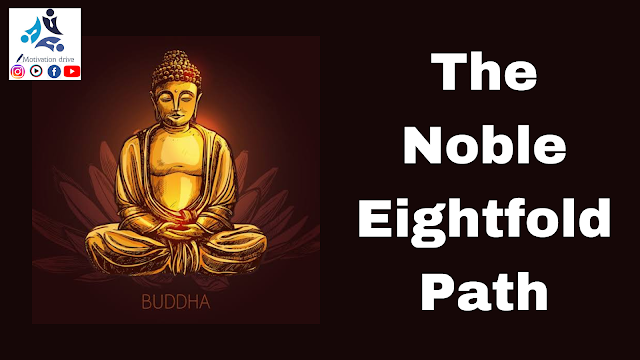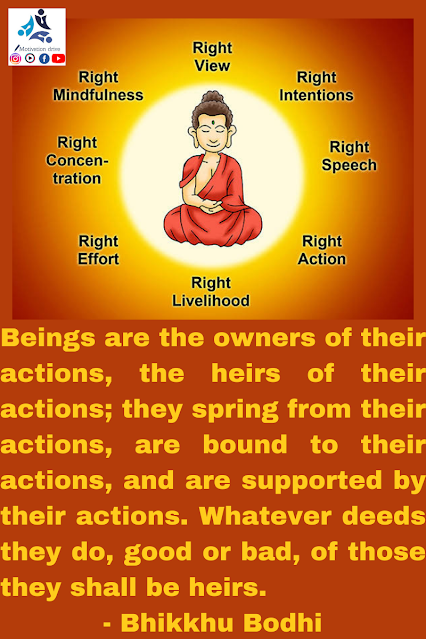Introduction The phrase “dark manipulation” makes people uncomfortable—and for a good reason. It is often associated with control, deception, or emotional games. But not everything that feels uncomfortable is unethical. In a noisy world filled with constant opinions, validation-seeking, and social pressure, subtle psychological awareness is not about controlling others. It is about protecting your self-respect. Most people are not manipulated because they are weak. They are manipulated because they are overly available, overly agreeable, and overly eager to be liked. What follows are not tricks or games. They are psychological truths about human behavior—truths many people learn only after being taken for granted, overlooked, or disrespected. Understanding these principles does not make you manipulative. It makes you aware. The Power of Not Laughing at Everything Many people believe that laughing at every joke or agreeing with every ...
Introduction
The Noble Eightfold Path was given by Buddha as a guideline to be taken on only when each step is fully accepted as part of the life you seek. It is different from many teachings because of its positive and affirmative nature. It teaches self-empowerment and not prohibitions. Buddha taught the Eightfold Path in his first teaching at Deer Park. Buddhism seeks to promote the process of self-discovery and learning in life. The steps of the noble eightfold path are the directions given by Buddha that are as clear and practical even today for his followers as they were when he gave them for the first time.The Noble Eight-Fold Path
1. Right Understanding (Samma ditthi): The first step of the noble eightfold path given in Buddhism is Right Understanding or Right View which means we must see the world as it really is rather than what we want or believes it to be.Buy these life transforming books to change your life:
Ikigai | Rich Dad Poor Dad | Hyperfocus | The 5 AM Club | The 10X Rule
2. Right thought/Intent (Samma sankappa): This step tells us to decide what our heart wants. Right Intent should come from the heart. It mentions that we should recognize the equality of all life and have compassion for all starting with ourselves. It includes persistence and passion.
3. Right Speech (Samma vaca): It means that we must abstain from lying and rude speech. We must not do idle chatter or tell anyone about what another person says about us to harm their relationship. This step involves the recognition of the truth and moving closer to everyday compassionate living.
4. Right action (Samma kammanta): According to this Zen principle, we must not kill or injure anyone. Also, we must not take anything which is not given, and abstain from any sexual misconduct or any material desire. We should take an ethical approach in life considering others and the world we live in.
5. Right livelihood (Samma ajiva): This is the fifth step of the noble eightfold path. It mentions that we should not trade in meat, living beings, liquor, or any kind of weapons. It says that any work that has a lack of respect for life will act like a barrier on the spiritual path. Buddhism believes in and promotes the equality of all living beings and respect for all life forms.
2. Right thought/Intent (Samma sankappa): This step tells us to decide what our heart wants. Right Intent should come from the heart. It mentions that we should recognize the equality of all life and have compassion for all starting with ourselves. It includes persistence and passion.
3. Right Speech (Samma vaca): It means that we must abstain from lying and rude speech. We must not do idle chatter or tell anyone about what another person says about us to harm their relationship. This step involves the recognition of the truth and moving closer to everyday compassionate living.
4. Right action (Samma kammanta): According to this Zen principle, we must not kill or injure anyone. Also, we must not take anything which is not given, and abstain from any sexual misconduct or any material desire. We should take an ethical approach in life considering others and the world we live in.
5. Right livelihood (Samma ajiva): This is the fifth step of the noble eightfold path. It mentions that we should not trade in meat, living beings, liquor, or any kind of weapons. It says that any work that has a lack of respect for life will act like a barrier on the spiritual path. Buddhism believes in and promotes the equality of all living beings and respect for all life forms.
6. Right Effort (Samma vayama): The sixth step guides us to prevent the arising of unwholesome states, and generate wholesome states which are known as the bojjhagā (Seven Factors of Awakening). You should welcome clear and honest thoughts to produce the right efforts leaving behind anger and jealousy.
7. Right mindfulness (Samma sati): This step talks about right mindfulness which is a quality that guards or watches over the mind. Sati refers to "bare attention" in Vipassana Movement. It tells us to never be absent-minded and be conscious of what one is doing.
8. Right concentration (Samma samadhi): The last step of the noble eightfold path is the right concentration which means practicing four stages of dhyāna ("meditation"). In it, you turn your mind to focus on one object. It is significant as once your mind is uncluttered, then, it can be concentrated to achieve your desired thing or goal.
7. Right mindfulness (Samma sati): This step talks about right mindfulness which is a quality that guards or watches over the mind. Sati refers to "bare attention" in Vipassana Movement. It tells us to never be absent-minded and be conscious of what one is doing.
8. Right concentration (Samma samadhi): The last step of the noble eightfold path is the right concentration which means practicing four stages of dhyāna ("meditation"). In it, you turn your mind to focus on one object. It is significant as once your mind is uncluttered, then, it can be concentrated to achieve your desired thing or goal.
Conclusion
The noble Eightfold Path given in Buddhism is a formulation of the path to enlightenment. Siddhartha Gautama delivered this idea of the Eightfold Path after his enlightenment. This is not a sequential learning path rather it talks about eight different aspects of our lives that are to be integrated into our everyday life. This sets an environment for us to move closer to the Buddhist path. If we follow these eight steps, we see very deep changes in our lives not only externally but also internally.


Comments
Post a Comment
Please do not add any spam link in the comment box